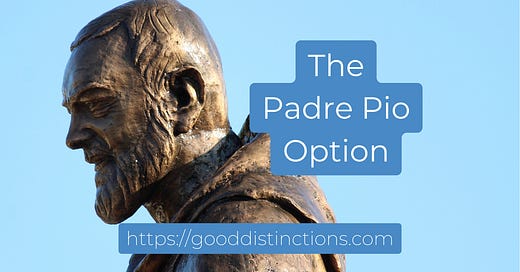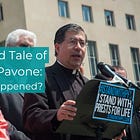(September 23 - St. Pio of Pietrelcina)
St. Pio of Pietrelcina (better known as Padre Pio) was born on May 25, 1887 and entered the novitiate of the Capuchin Friars at Morcone at the age of sixteen in 1903. He took the Franciscan habit and the name Brother Pio. At the end of his novitiate year, he took simple vows and then made his solemn profession in 1907. Three years later, he was ordained a priest.
As a priest, Padre Pio became well known for his clear calling as a spiritual director who had a beautiful and manifest devotion to the Holy Mass and the Sacrament of Penance. Over the course of his life, he was said to have known about unconfessed sins of people in the confessional, bilocation, receiving the stigmata, and being besieged by Satan himself especially as he attempted to sleep. In the Franciscan style, he practiced mortification and treated all he met “with justice, frankness, and great respect (Vatican Biography of Padre Pio).”
After he received the stigmata, thousands of pilgrims flocked to his monastery. There were unjust accusations that he had wounded himself and sustained the wounds and coloring with carbonic acid. Some in the Vatican were concerned of his fame and that he may have been a liar and false prophet. So, they launched multiple investigations and planted listening devices in the monastery.
When the locals heard that he might be moved away, a mob descended upon the monastery. They barred the door so that the Vatican official could not get to Padre Pio. Pio came out and said to the mob: “My blessed children… Now I implore you to listen to me, as you always do, and return to your homes without harming anyone (Padre Pio: The True Story).” Knowing that they could not peacefully move him, the Vatican restricted him:
“Padre Pio is to be stripped of all the faculties of his priestly ministry except the faculty to celebrate the Holy Mass, which he may continue to do, provided that it is done in private, within the walls of the friary, in the inner chapel, and not publicly in church.”
Difficult as this was, he obeyed and submitted to the restrictions. After his superior read him the decree, Padre Pio responded: “God’s will be done… The will of the superiors is the will of God.” What a saintly response! What beautiful virtue!
For the next several years, he celebrated Mass privately and accepted no visitors, nor did he write to anyone. He came to learn that many were writing in his defense, submitting petitions, writing letters, and publishing books. He was taken aback by this and said:
“I must repeat that I am very disgusted by the unworthy behavior of certain false prophets who speak in my behalf … they should stop this false and unworthy propaganda, but meanwhile they have followed in their morbid fanaticism, not caring about the supreme authority of the church.
I turn, therefore, as a son most humble and completely obedient to the Catholic Church … With profound humility I kiss your sacred ring and profess myself to your excellency your most humble and obedient son.”
The accusations against were proven false and he was rehabilitated before his death. How incredible to see a modern saint unjustly accused who chose to remain in silent trust of God’s providence.
So, when we see people in the Church who are restricted from ministry by their superiors, we should encourage them to do like Padre Pio. We have recent examples, such as the saga of Frank Pavone to see what should *not* be done. For my initial remarks after the news of his laicization, please click the link below:
We could all stand to grow in obedience of those with legitimate authority over us. Otherwise, we are no better than Martin Luther or any other heretic or schismatic in History. The saintly response is the Padre Pio option. Period.
St. Padre Pio, pray for us, that we might grow in imitation of Christ by imitation of your virtue of obedience. Amen.





